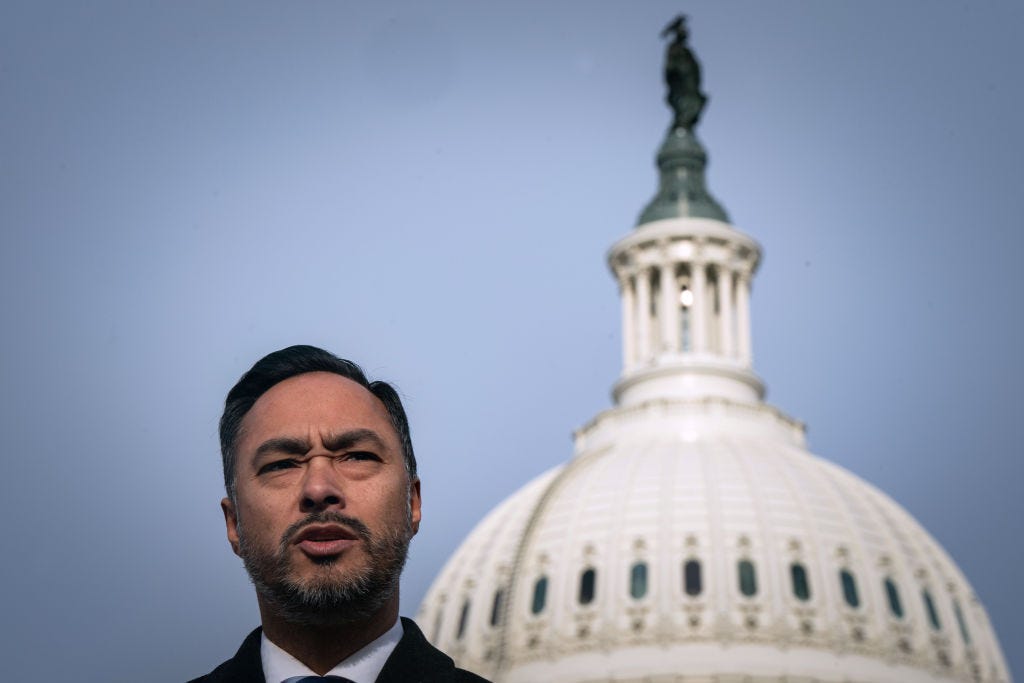They are here because we were there
Rep. Joaquin Castro on making the connection between the migrant crisis and the legacy of American foreign policy. Plus: his thoughts on Democrats and Gaza and staying hopeful when everything is bad
People move.
It’s the craziest thing, but sometimes people are in one location, and then they are in another location. Sometimes that location is another country. This seems to make certain people very, very angry, including people who themselves have moved.
Today far-right extremists in Donald Trump’s MAGA movement are trying to turn migration into their new cause célèbre — a crisis that demands autocratic solution. The need the border as their Reichstag fire.
What they ignore, of course, is the connection between the situation with migrants on the border and in many American cities, on one hand, and, on the other, and the legacy of American foreign policy.
“We are here because you were there,” the Sri Lankan-British thinker Ambalavaner Sivanandan once said, making a similar connection between migration to the United Kingdom and the legacy of British colonialism.
Understanding this connection is a first step toward solving the immigration system.
One figure in American public life who doesn’t shy away from making this connection is Representative Joaquin Castro, a Texas Democrat who has worked extensively on the border issue as well as on foreign policy questions through his service on the House Foreign Affairs Committee, the Armed Services Committee, and the House Permanent Select Committee on Intelligence.
As Castro sees it, foreign policy not only starts at home, but also ends up right back where it started. The United States can’t maintain leadership on human rights worldwide without practicing it at home, nor can it intervene abroad without expecting migrants from a destabilized world.
We spoke to Congressman Castro the other day about the reality of the situation at the U.S.’s southern border, whether Democrats are foolish to assume good faith in attempting compromise with Republicans, the likelihood of a ceasefire and ultimate end to the Israel-Gaza conflict, and what gives him hope amid so much darkness.
On the border
You’ve talked a lot about how what we do at home affects the world, and what we do in the world affects what happens at home. Can you talk about those two ideas as they relate to the border and other issues?
On the asylum issue, there's been this talk of shutting down the border, along with the invasion rhetoric and the replacement rhetoric. It makes it hard for the United States to be a leader among nations in the world and to press other nations to take desperate populations who are fleeing violence and oppression and starvation if we ourselves become so harsh and draconian on the issue. So the world is watching how the United States handles its border situation.
As I talk to ambassadors and others, they'll make the point (though hardly ever directly): “Hey, if you guys aren't willing to take people, then why are we going to take people?” Or they’ll ask: “If you're not willing to uphold international asylum laws, then why would you think that other countries are going to do that?” So it matters what we do. It makes a big difference how we handle these issues at home.
And then turning to our own history: I don't think we've ever fully reckoned with the United States' role in Central and South America in the 1970s and 1980s, the rogue leaders that we supported. We supported uprisings in different parts of Central America that caused instability and serious migration decades ago that we're still reckoning with.
Sometimes we act as though we are completely independent of what is happening in those places. I think we have not taken on these challenges of migration. We have tried tactics. I don't know that we've necessarily tried overarching strategies. You've got to help these countries really build up their economies so that they can have better control over security and the safety of their people.
I don't know if you’ve heard this before, but there’s this phrase associated with arguments about migration in Britain and the legacy of colonialism in the places from which many of the migrants came: "We are here because you were there."
Yeah, I hadn't heard that, but it makes sense, thinking about history. What we did in Central America for decades had a profound impact on their societies, on the stability of their societies, on the migration, on the economy, on all of it. And in a lot of the debate, we don't even talk about that. It just gets glanced over. Everything is treated as though nothing existed until today.
I think a lot of Americans are, frankly, bewildered about what the actual situation on the border is, given all the conflicting information and posturing and ideology and games. Can you give me your sense of what is actually happening on the border right now?
Well, I think it's true that, in recent months, we’ve had more people coming to present for asylum at the U.S./Mexico border, but that has ebbed some recently. What's really heated the politics up is not the reality at the border, it's the heated rhetoric by Republicans who have decided that they're going all in on invasion and replacement rhetoric, and that's what's fundamentally different about what we're seeing now.
We have dealt with high numbers of asylum seekers at the border before and immigrants at the border, but Republicans now are labeling this as an invasion and talking about how these asylum seekers, most of them Black and brown people, are being used to replace white Americans in the United States, and I think that is what has really fueled the controversy lately.
Do you think there's any truth to the notion that, institutionally, the government has lost control of the border in terms of an immigration system that it is able to administer its own goals and ends?




